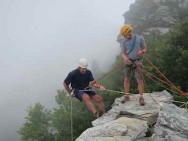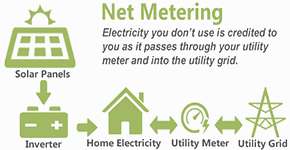
Veterans forge a wild kind of peace
Relationships begun on rope courses, rock climbs and backpacking treks translate into an ease around the campfire where many US Army veterans start to talk about themselves, willing to share their stories about that most difficult of subjects for a male – how they feel.
Forty feet up in the air, eye-level with the autumn treetops, Rusty Achenbach felt his heart racing as he inched his way across the scariest part of the ropes course — a wobbly beam dubbed “Too Slack Jack.”∙”Watching, Rusty,” his spotter called below. Everybody in Crew 6 was watching, rooting for him. Strangers he hadn’t known four days before were now his trusted band of brothers and sisters.∙At the end of the ropes course, Achenbach found himself perched on the edge of a platform, stepping into thin air to swing in a huge arc back and forth through the bright leaves. “Awesome!” he yelled.∙Just another “aha” moment at the North Carolina Outward Bound School.
Achenbach and Crew 6 aren’t the typical teenagers or corporate executives who tackle wilderness adventures under Table Rock Mountain overlooking Linville Gorge. These military veterans have seen combat in Iraq and Afghanistan. Now they were fighting to find peace for themselves back home.
“I’m scared of heights. My boss won’t even let me get on a ladder at work. You guys getting me up there was pretty impressive,” Achenbach said, safely back on the ground as Crew 6 circled up for the debriefing. No adventure goes without a discussion of the emotions released and the lessons learned.
Every ropes course has its significant moment, explained instructor Shane Ambro. “You can feel the collective energy joining one person on part of the course.”
“The look on your face was priceless,” Army vet John Moder teased. “They ought to make you the poster child for Outward Bound. The motto could be ‘You’re dumb if you don’t come.'”
Moder was surprised to learn that the courses were free to military veterans. Outward Bound picking up not only the tuition, but also air travel and hotel stays.
“The vets have given for the country. We want to be able to give back to them,” said Matt Rosky, the veterans program coordinator for the NC Outward Bound School.
The Outward Bound School at Hurricane Island, Maine started a veterans program in the 1970s, working with those returning from the Vietnam War. The programs soon spread to other Outward Bound schools nationwide, but funding started to peter out by the late 1990s.
With the terrorist attacks of Sept. 11, 2001, and the global war on terror with wars in Iraq and Afghanistan, more veterans have gone on multiple tours of duty and cycled back into civilian life, some more successfully than others. With post-traumatic stress disorder, loneliness, depression, anxiety, alcohol and drug abuse, younger veterans are also less likely than older veterans to seek help or counseling
